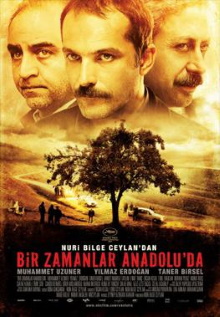
I planned to watch this earlier film by director Nuri Bilge Ceylan long before our trip to Turkey, but actually visiting it seemed to give me a much better appreciation of the place and its people. This one was made before even Winter Sleep and so we were somewhat surprised to note that it has much less dialogue than we expected. Also, while we were both disappointed by The Wild Pear Tree, this one is simply excellent.
A group of vehicles travels at night across the rural Anatolian landscape, carrying police officers, a prosecutor, a doctor, soldiers, assistants and suspects. From their conversations, we infer that one of the suspects has confessed to a killing and they are trying to find the location where the body is buried. However the main suspect Kenan is either unable or unwilling to recall the exact location and so they go from place to place as it grows later, making the police chief Naci increasingly frustrated. Eventually they make for a nearby village to get some food where the head of the village takes the opportunity to ask the prosecutor Nusret to speak to the governor about extra funding. Meanwhile throughout the night and the next day, Nusret and the doctor Cemal have a conversation about a man’s wife who died after predicting exactly when she would die right after giving birth. Nusret is inclined to ascribe this story to the mysteriousness of life and death but Cemal examines it rationally and suggests that the woman may have committed suicide.
As usual with these grandmasters of cinema, what stands out first of all is the sheer beauty and the exacting craft that pervades every frame of the film. The control over light is incredible for example as they travel across the countryside. Even through the dim light, you can still make out terrain features and the contrast makes the landscape only more visually interesting. I also love how the director uses small shots that are utterly inconsequential in story terms, such as a apple floating down a stream, to moderate the pacing and control the atmosphere. As I mentioned before, while Winter Sleep stood out for how much dialogue there is in it, this one is less wordy but it is notable how much non-verbal communication there is in it. For example, neither Nusret nor Cemal puts it in words, but it is obvious that both of them understand that Nusret’s story is really about his own wife. This film is just a fantastic exemplar of cinematic craftsmanship on multiple levels.
As for theme and meaning, it’s a little difficult at first to grasp what the director is trying to impart and there is a worry that the film consists of nothing but the group going around futilely trying to find the corpse over the course of the whole night. But rest assured that the director is working towards a point and there is a confluence between the main plot and the conversation between Nusret and Cemal. I do regret that it’s very easy to fail to understand why Cemal acts as he does at the end as Kernan’s confession, so to speak, takes place offscreen and consists of only a single line spoken by the police chief. The core insight of parents needing to do right by their parents isn’t particularly novel but the director does convey it in an effective manner and closes off the film on an emotive note.
Even apart from the plot itself I thoroughly enjoyed the exacting detail of the film as a sort of investigative procedural that at the same reveals a bit of how life in rural Turkey works. Apparently all this is quite accurate as one of the co-writers based it off of a real life incident and I rather liked how their methodology is markedly different from the American routines we’re all more familiar with from their media. Most of all, it’s a masterpiece of cinematic beauty that is a sheer joy to just look at.